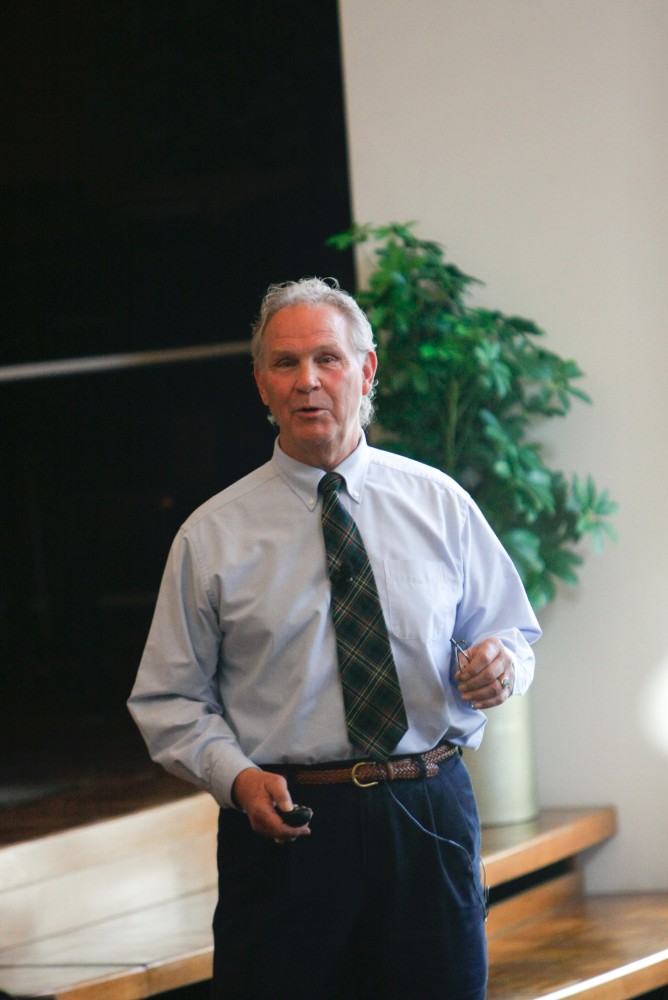Professor, coach retires after 41 years at GV

Jim Scott
Nov 11, 2010
After 41 years as a professor of movement science and 20-year run as the Grand Valley State University wrestling coach, James Scott is stepping off the mat and into retirement.
Scott signed on to GVSU in 1969 as an assistant professor of physical education with the intent to build the university’s first wrestling program.
“I knew I wanted to be a coach back in high school,” Scott said. “My coaches were all my idols, so to speak. I looked up to them – they were my youth leaders at my church — and I always thought, ‘If you’re going to be like somebody, that’s who to be like.’”
In the span of 20 years, Scott helped coach 55 All-Americans and eight individual National Champions, a list that includes Hall-of-Famer Rick Vaughn, GVSU’s first ever All-American in 1972, and Mark Mangianti, its first National Champion in 1976.
“I think of Jim as a renascence man,” said Steve Glass, associate dean of the Brooks College of Interdisciplinary Studies. “He has interests and abilities in so many areas. He is a nationally-known coach, has great knowledge in kinesiology across many sub disciplines, created an honors course that mixes physics, chemistry and physiology and brought wellness and exercise science curriculum to Grand Valley when the field was just beginning.”
Scott said he began to notice the rapid decrease of wrestling programs at a collegiate level when Title IX caused many schools to drop men’s sports to “achieve equity,” resulting in the disbandment of more than half of the established collegiate wrestling programs.
Scott also began to notice other trends in the sport.
“I think what brought my name into the spotlight was the fact that I was the only person who stopped to identify and document what was happening,” he said. “Everybody knew what was happening, but nobody knew the extent.”
“What was happening” was weight management, and Scott said when he saw the topic had begun to wrongfully define the sport of wrestling, he set his sights on finding a solution to the growing stigmas.
Body composition as it relates to sport performance became a subject of a research grant given to him by the NCCA and the subject of hundreds of presentations and more than 20 published articles by Scott.
He went on to receive more than 10 awards while occupying his place in the top 1 percent of researchers in the field of body composition and sport performance while pioneering the development of several NCAA subprograms, such as the Michigan Wrestling Weight Monitoring Program, with hopes of eradicating the danger that accompanied wrestlers who tried to make weight.
“I look back and I think, ‘This has been a lot of fun,’” Scott said. “Hard work? Yeah, but when I look back, I can say, ‘Well, cool – that all worked out pretty well.’”
Scott formally bid his full-time status a farewell Wednesday with his 50th at Noon lecture “The Early History of Physical Education and Intercollegiate Athletics at GVSU,” telling the story of the program that grew beneath him throughout the past four decades.
“Jim is a highly respected member of our department and has made many significant impacts on our profession and the safety of those participating in the sport of wrestling,” said Brain Hatzel, associate professor and chairperson of the movement science department. “His contributions are unmatched and should be an example to all faculty of how we should move forward in our professional work.”
Although Scott retired from full-time professorship, he will still occupy an adjunct office space in the movement science hallway and teach a few courses this winter while continuing his latest research in exploring evolutionary biology.
Looking back, Scott said he only ever aimed to make an impact. It is those who have journeyed with him, wrestling life alongside him, that he said he will miss the most from his time at GVSU.
“Those are the kinds of things that – from my perspective – make me look back and say, ‘I think I did my job,’” he said. “Was this run a success? Yeah, I think so.”























